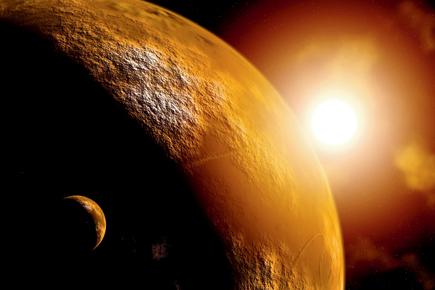Researchers from the Massachusetts Institute of Technology (MIT) have questioned the technical feasibility of the 'Mars One' project that aims to establish the first human colony on the Red Planet by 2025

Researchers from the Massachusetts Institute of Technology (MIT) have questioned the technical feasibility of the 'Mars One' project that aims to establish the first human colony on the Red Planet by 2025
Washington: Researchers from the Massachusetts Institute of Technology (MIT) have questioned the technical feasibility of the 'Mars One' project that aims to establish the first human colony on the Red Planet by 2025.
'Mars One' is a non-profit organisation based in the Netherlands that has put forward conceptual plans to establish a permanent human colony on Mars. Mars
Mars
ADVERTISEMENT
The mission plans to initially send four astronauts on a one-way trip to Mars where they would spend the rest of their lives building the first permanent human settlement.
The MIT researchers developed a detailed settlement-analysis tool to assess the feasibility of the 'Mars One' mission and found that new technologies will be needed to keep humans alive on Mars.
"We are not saying that 'Mars One' is infeasible but we do think it is not really feasible under the assumptions they have made. We are pointing to technologies that could be helpful to invest in, with high priority, to move them along the feasibility path," explained Olivier de Weck, an MIT professor of aeronautics, astronautics and engineering systems.
For example, if all food is obtained from locally grown crops as 'Mars One' envisions, the vegetation would produce unsafe levels of oxygen which would set off a series of events that would eventually cause human inhabitants to suffocate.
"To avoid this scenario, a system to remove excess oxygen would have to be implemented - a technology that has not yet been developed for use in space," de Weck noted.
Similarly, the Mars Phoenix lander discovered evidence of ice on the Martian surface in 2008, suggesting that future settlers might be able to melt ice for drinking water - another 'Mars One' goal.
But according to the MIT analysis, current technologies designed to "bake" water from soil are not yet ready for deployment, particularly in space.
The team also performed an integrated analysis of spare parts re-supply - how many spare parts would have to be delivered to a Martian colony at each opportunity to keep it going.
The researchers found that as the colony grows, spare parts would quickly dominate future deliveries to Mars, making up as much as 62 percent of payloads from Earth.
According to the 'Mars One' plan, six Falcon Heavy rockets would be required to send up initial supplies before the astronauts' arrival.
But the MIT assessment found that the needed supplies would instead require 15 Falcon Heavy rockets.
The researchers presented their analysis at the International Astronautical Congress in Toronto recently.
 Subscribe today by clicking the link and stay updated with the latest news!" Click here!
Subscribe today by clicking the link and stay updated with the latest news!" Click here!







